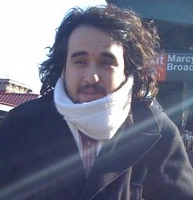By Stacy Jannis
Kavli Science Video Contest Manager
The Kavli Science in Fiction Video Contest challenges Gr 6-12 students to examine the science in fiction, including science fiction movies, TV shows, and games. Our contest advisors include science educators , scientists, and Hollywood scifi visual effects experts.
 Sebastian Alvarado is a postdoctoral fellow in the Dept. of Biology at Stanford, with a research focus on epigenetics, as well as co-founder of the video game science consultancy group, Thwacke! Consulting. Thwacke offers scientific insight from a diversity of disciplines to aid in narrative design, world building, and ultimately creating believable content for the video game industry. Thwacke has consulted on video games including Wasteland 2 and Outlast.
Sebastian Alvarado is a postdoctoral fellow in the Dept. of Biology at Stanford, with a research focus on epigenetics, as well as co-founder of the video game science consultancy group, Thwacke! Consulting. Thwacke offers scientific insight from a diversity of disciplines to aid in narrative design, world building, and ultimately creating believable content for the video game industry. Thwacke has consulted on video games including Wasteland 2 and Outlast.
What services does Thwacke provide?
games?
 At the time, I was finishing my doctorate at McGill University in Montreal, where there's a vibrant game development community. This locale provided me with the added opportunity to playtest new games and supplement the humble salary of a graduate student. During the process, I got a chance to see how games are made and the thought that goes into them. I also happened to see a developer on wikipedia looking at the entry for DNA. My background was in molecular biology and it made me think that a short conversation would have saved time and avoided any misrepresentations of my field. After a bit of planning and getting to know more developers, I realized there was value in bringing this type of novelty to the sci-fi genre in the industry.
At the time, I was finishing my doctorate at McGill University in Montreal, where there's a vibrant game development community. This locale provided me with the added opportunity to playtest new games and supplement the humble salary of a graduate student. During the process, I got a chance to see how games are made and the thought that goes into them. I also happened to see a developer on wikipedia looking at the entry for DNA. My background was in molecular biology and it made me think that a short conversation would have saved time and avoided any misrepresentations of my field. After a bit of planning and getting to know more developers, I realized there was value in bringing this type of novelty to the sci-fi genre in the industry.a game?
 We hope that our input on specific projects inspires an interest in science in players. Most of our consultants chose their careers based on childhood inspiration from comic books, books, movies, and video games. We hope that being present in such a pervasive medium will achieve the same effect. Within this scope, we also curate our ideas to draw the most interest and reward for players, with individuals feeling smarter as they play. It’s the difference between a discussion about science that can engage an audience in a relatable fashion instead of boring them with mundane details.
We hope that our input on specific projects inspires an interest in science in players. Most of our consultants chose their careers based on childhood inspiration from comic books, books, movies, and video games. We hope that being present in such a pervasive medium will achieve the same effect. Within this scope, we also curate our ideas to draw the most interest and reward for players, with individuals feeling smarter as they play. It’s the difference between a discussion about science that can engage an audience in a relatable fashion instead of boring them with mundane details. In all honesty, I have no idea. The games I played 10 years ago are very different than the games I play today. In my realm, I see games as excellent tools to conduct and crowd-source scientific research. For example, it's much easier to design a game that reaches 1 million patients than to invite 1 million patients into a clinic for questionnaires. At the same time, I feel these same tools will be a catalyst for learning within player communities and schools. Outside of my realm, I have no idea but I can't wait to find out!
In all honesty, I have no idea. The games I played 10 years ago are very different than the games I play today. In my realm, I see games as excellent tools to conduct and crowd-source scientific research. For example, it's much easier to design a game that reaches 1 million patients than to invite 1 million patients into a clinic for questionnaires. At the same time, I feel these same tools will be a catalyst for learning within player communities and schools. Outside of my realm, I have no idea but I can't wait to find out!
Follow Sebastian on twitter at @sebcredible and follow Thwacke at @thwackemontreal.